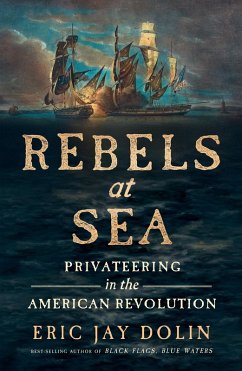Winner of the Samuel Eliot Morison Award for Naval Literature
Winner of the Fraunces Tavern Museum Book Award
A Massachusetts Center for the Book "Must-Read"
Finalist for the New England Society Book Award
Finalist for the Boston Authors Club Julia Ward Howe Book Award
The bestselling author of Black Flags, Blue Waters reclaims the daring freelance sailors who proved essential to the winning of the Revolutionary War.
The heroic story of the founding of the U.S. Navy during the Revolution has been told many times, yet largely missing from maritime histories of America's first war is the ragtag fleet of private vessels that truly revealed the new nation's characterabove all, its ambition and entrepreneurial ethos.
In Rebels at Sea, best-selling historian Eric Jay Dolin corrects that significant omission, and contends that privateers, as they were called, were in fact critical to the American victory. Privateers were privately owned vessels, mostly refitted merchant ships, that were granted permission by the new government to seize British merchantmen and men of war. As Dolin stirringly demonstrates, at a time when the young Continental Navy numbered no more than about sixty vessels all told, privateers rushed to fill the gaps. Nearly 2,000 set sail over the course of the war, with tens of thousands of Americans serving on them and capturing some 1,800 British ships. Privateers came in all shapes and sizes, from twenty-five foot long whaleboats to full-rigged ships more than 100 feet long. Bristling with cannons, swivel guns, muskets, and pikes, they tormented their foes on the broad Atlantic and in bays and harbors on both sides of the ocean.
The men who owned the ships, as well as their captains and crew, would divide the profits of a successful cruiseand suffer all the more if their ship was captured or sunk, with privateersmen facing hellish conditions on British prison hulks, where they were treated not as enemy combatants but as pirates. Some Americans viewed them similarly, as cynical opportunists whose only aim was loot. Yet Dolin shows that privateersmen were as patriotic as their fellow Americans, and moreover that they greatly contributed to the war's success: diverting critical British resources to protecting their shipping, playing a key role in bringing France into the war on the side of the United States, providing much-needed supplies at home, and bolstering the new nation's confidence that it might actually defeat the most powerful military force in the world.
Creating an entirely new pantheon of Revolutionary heroes, Dolin reclaims such forgotten privateersmen as Captain Jonathan Haraden and Offin Boardman, putting their exploits, and sacrifices, at the very center of the conflict. Abounding in tales of daring maneuvers and deadly encounters, Rebels at Sea presents this nation's first war as we have rarely seen it before.
Winner of the Fraunces Tavern Museum Book Award
A Massachusetts Center for the Book "Must-Read"
Finalist for the New England Society Book Award
Finalist for the Boston Authors Club Julia Ward Howe Book Award
The bestselling author of Black Flags, Blue Waters reclaims the daring freelance sailors who proved essential to the winning of the Revolutionary War.
The heroic story of the founding of the U.S. Navy during the Revolution has been told many times, yet largely missing from maritime histories of America's first war is the ragtag fleet of private vessels that truly revealed the new nation's characterabove all, its ambition and entrepreneurial ethos.
In Rebels at Sea, best-selling historian Eric Jay Dolin corrects that significant omission, and contends that privateers, as they were called, were in fact critical to the American victory. Privateers were privately owned vessels, mostly refitted merchant ships, that were granted permission by the new government to seize British merchantmen and men of war. As Dolin stirringly demonstrates, at a time when the young Continental Navy numbered no more than about sixty vessels all told, privateers rushed to fill the gaps. Nearly 2,000 set sail over the course of the war, with tens of thousands of Americans serving on them and capturing some 1,800 British ships. Privateers came in all shapes and sizes, from twenty-five foot long whaleboats to full-rigged ships more than 100 feet long. Bristling with cannons, swivel guns, muskets, and pikes, they tormented their foes on the broad Atlantic and in bays and harbors on both sides of the ocean.
The men who owned the ships, as well as their captains and crew, would divide the profits of a successful cruiseand suffer all the more if their ship was captured or sunk, with privateersmen facing hellish conditions on British prison hulks, where they were treated not as enemy combatants but as pirates. Some Americans viewed them similarly, as cynical opportunists whose only aim was loot. Yet Dolin shows that privateersmen were as patriotic as their fellow Americans, and moreover that they greatly contributed to the war's success: diverting critical British resources to protecting their shipping, playing a key role in bringing France into the war on the side of the United States, providing much-needed supplies at home, and bolstering the new nation's confidence that it might actually defeat the most powerful military force in the world.
Creating an entirely new pantheon of Revolutionary heroes, Dolin reclaims such forgotten privateersmen as Captain Jonathan Haraden and Offin Boardman, putting their exploits, and sacrifices, at the very center of the conflict. Abounding in tales of daring maneuvers and deadly encounters, Rebels at Sea presents this nation's first war as we have rarely seen it before.
Dieser Download kann aus rechtlichen Gründen nur mit Rechnungsadresse in A, D ausgeliefert werden.









